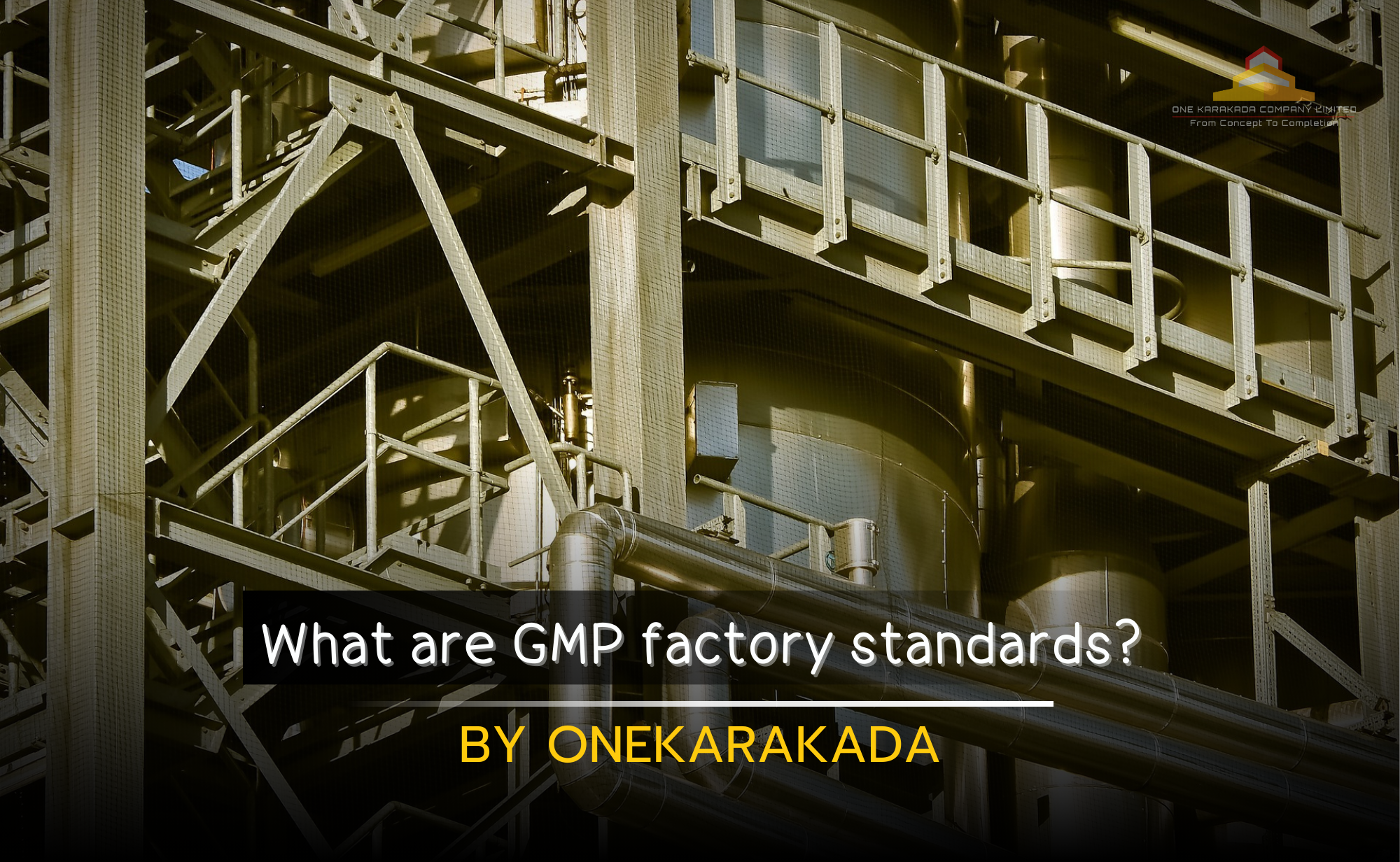The construction of factories, particularly those involved in the production of food, beverages, supplements, and medications, requires adherence to stringent international standards such as Good Manufacturing Practices (GMP). These standards ensure that products are consistently produced and controlled according to quality benchmarks.
Key elements of GMP factory construction include creating cleanable surfaces, ensuring proper ventilation, and implementing measures to prevent contamination. Selecting a construction company with expertise in GMP standards is crucial for businesses to ensure that every step of the construction process aligns with these rigorous requirements.
ONE KARAKADA Co., Ltd. a design and build construction company in Thailand is another company that builds GMP standard factories as well as accepts and builds factories and warehouses, prefabricated structures, and general factories with international quality standards and has engineering and architectural experts to supervise every construction process until completion. Because we are a design and build construction company in Thailand.
What is a GMP standard factory?
Adhering to Good Manufacturing Practice (GMP) standards is crucial in the pharmaceutical industry to ensure product safety and quality. GMP encompasses two main types: General GMP, which applies to all food types and focuses on basic hygiene principles,
and Specific GMP, which includes additional requirements tailored to particular products. This layered approach helps manufacturers meet stringent regulatory requirements and assures consumers that the products they use are produced according to the highest standards. Compliance with GMP is not just a regulatory obligation but also a commitment to excellence in manufacturing.
Why GMP?
Consumer Safety
- Manufacturing products that are not manufactured in accordance with GMP standards may pose a health risk to consumers due to the possibility of hazardous or toxic contamination in the product.
Consumer Confidence
- GMP standards give consumers confidence in the quality of the products they use, with strict control over production processes and key substances, as well as strict safety checks and quality standards.
Saving Resources
- Adhering to Good Manufacturing Practice (GMP) standards is crucial for ensuring product quality and safety in the manufacturing industry. By following these guidelines, companies can minimize the risk of contamination, errors, and inconsistencies. This not only protects consumers but also enhances the efficiency of the production process, leading to cost savings and more effective resource utilization. Ultimately, GMP compliance is an investment in both the company’s reputation and its bottom line.
Image Enhancement and Trust
- Adherence to Good Manufacturing Practice (GMP) standards is indeed crucial for manufacturing entities. It not only ensures that products are consistently produced and controlled according to quality standards but also serves as a key market differentiator. By meeting GMP standards, factories demonstrate their commitment to safety and quality, fostering consumer confidence and loyalty. This commitment can lead to a stronger brand reputation and potentially increase market share. In highly regulated industries, such as pharmaceuticals and food, GMP compliance is not just beneficial; it’s often a regulatory requirement.
Legal requirements:
- Good Manufacturing Practice (GMP) standards are critical for ensuring the safety and efficacy of health-related products. These regulations, which are enforced in many countries around the world, require manufacturers to follow strict guidelines covering all aspects of production. This includes the sourcing of raw materials, the training and hygiene of staff, equipment maintenance, and the testing and quality assurance of the final product. Adherence to GMP standards helps protect consumers and ensures that products meet consistent quality criteria. Compliance with these standards is not just a legal obligation but also a moral one, as it directly impacts the health and well-being of end-users.
GMP Procedure
Constructing a factory that adheres to Good Manufacturing Practice (GMP) standards is indeed a complex endeavor, requiring meticulous planning and execution. The steps typically involve site selection, design and construction, validation of equipment and processes, and establishing strict quality control procedures. Each phase is critical to ensure that the final products meet the highest standards of quality and safety, reflecting the rigorous requirements of GMP guidelines. This structured approach not only helps in maintaining product integrity but also in gaining consumer trust and regulatory approval.
Planning and design
- Defining plant objectives and requirements
- Choosing the right location for the plant
- Design of factories and areas to suit GMP production processes and requirements
Equipment supply and installation
- Selection and procurement of suitable equipment and tools for production
- Installation and testing of equipment to ensure performance and safety standards
Production Management
- Determination of production processes and production capacities
- Creating and improving processes to meet GMP standards
- Cleanliness and safety management in factories
Training and Learning Analysis
- Training employees in compliance with GMP standards
- Analysis of learning outcomes and improvement of processes as needed
quality control
- Quality control of raw materials and manufactured products
- Production inspection and inspection to ensure that the quality is met.
Maintenance and care
- Maintenance of equipment and plant to enable stable and safe operation
- Maintaining the factory environment to ensure that it is suitable for production.
Audit and Assessment
- Production process audit to verify compliance with GMP standards
- Evaluation and improvement of plants and processes as needed.
Adhering to Good Manufacturing Practice (GMP) standards is indeed a critical step for manufacturers aiming to ensure the quality and safety of their products. This commitment to excellence not only safeguards consumer health but also fortifies the company’s reputation in the industry. By implementing GMP protocols, businesses can demonstrate their dedication to quality control and regulatory compliance, which can lead to increased trust and a stronger market presence.

